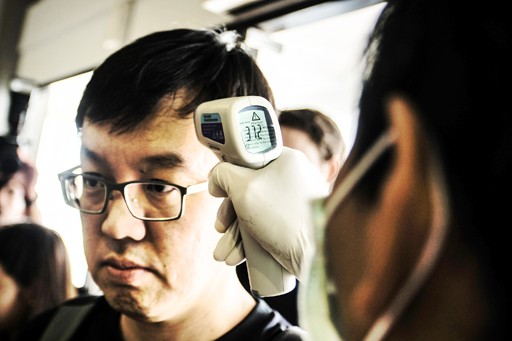Popular Reads
Top Results
Can't find what you're looking for?
View all search resultsPopular Reads
Top Results
Can't find what you're looking for?
View all search resultsGovt monitors major ports to prevent spread of Zika
Change text size
Gift Premium Articles
to Anyone
 Detection: A health official checks the body temperature of passengers arriving from Singapore in Yogyakarta on Friday. Singaporean authorities said on Sept. 1 that 151 people had tested positive for the Zika virus, including two pregnant women, as well as foreigners living and working there. (AFP/Suryo Wibowo)
Detection: A health official checks the body temperature of passengers arriving from Singapore in Yogyakarta on Friday. Singaporean authorities said on Sept. 1 that 151 people had tested positive for the Zika virus, including two pregnant women, as well as foreigners living and working there. (AFP/Suryo Wibowo)
T
he government will monitor travelers from Singapore arriving at four major points-of-entry in Indonesia, namely Jakarta, Batam, Bali and Medan, following confirmation on Thursday that an Indonesian woman was being treated in Singapore for the disease.
The Health Ministry has ordered the Port Health Office (KKP) to tighten monitoring, including by installing thermal scanners and requiring all passengers arriving from Singapore to fill in health alert cards (HAC) to ensure the early detection of the virus.
The Health Ministry has also assigned paramedics to eight seaports in Batam, Bintan and Karimun in Riau Islands, regions that have close transportation links with Singapore.
Despite the increased security measures, there are concerns over the government’s preparedness and ability to handle the increasing threat from the Zika virus, with Indonesia being one of the countries most vulnerable to infection.
Recently, media reports said the thermal scanners installed at Ngurah Rai International Airport in Bali, a popular tourist destination for Singaporeans with up to 300,000 visitors per month, were broken.
Thermal scanners installed at entry points warn authorities if there is a passenger with a body temperature of more than 38 degrees Celsius.
“I admit that some scanners are not working properly. But now we are helping so that they [the thermal scanners] are installed, especially in regions that experience high traffic from Singapore, such as Batam, Medan and Jakarta,” Health Minister Nila F. Moeloek said.
She said the thermal scanners were important because fever was one of the symptoms of the virus.
“The symptoms are fever and pain. So we focus on fevers. That’s why we need scanners. And if there are people suffering from a fever, we will ask for a blood test. The fever might not have been caused by the Zika virus so we need laboratory testing,” Nila said.
While Nila said the ministry would try to ensure that the Zika virus would not infiltrate the country from major points-of-entry, she admitted that the risks of the virus entering the country were significant.
“We have to remember that we have lots of ports in Indonesia,”she said.
Furthermore, there are cases of people infected by the Zika virus who do not develop fever.
“Another difficult aspect is that there are also people who do not have a fever. That’s why we ask people to fill out health alert cards. So if something happens, we can contact them and conduct a blood test,” said Nila.
The government has stepped up its monitoring efforts after an Indonesian woman was infected with the virus in Singapore.
The woman, a domestic worker for a family in Singapore, has fully recovered.
“She is recovering. Her condition is not too serious and she is receiving home treatment,” the Indonesian ambassador to Singapore, I Gede Ngurah Swajaya, told The Jakarta Post on Friday.
There are around 200,000 Indonesians working in Singapore, he said citing data from the embassy. “The embassy continues to monitor Indonesians living here and is asking them to take care of their health to prevent them being infected by Zika,” Swajaya said.
He praised the Singaporean government for competently managing the outbreak of the Aedes mosquito-borne virus that has infected at least 151 people in the city-state as of Thursday.
So far, no cure for the virus has been found.
However, a group of scientists in Indonesia is looking into the possibility of using a bacterium called Wolbachia to stop mosquitoes from transmitting the Zika virus. Wolbachia already infects 60 percent of insects worldwide.
The bacterium has been tested in four villages in Bantul and Sleman, Yogyakarta, from early 2014.
So far, the bacterium has proven to be effective in blocking the proliferation of dengue, which is the main objective of the research program.









